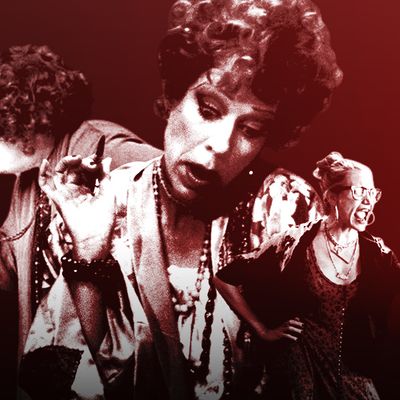
Miss Agatha Hannigan is a bad person. She’s an alcoholic. A child-abuser. A bitter orphanage-director who uses an 11-year-old to improve her social status. She’s Annie’s main villain, and a perfectly evil one at that. So it’s a mystery why this year’s movie adaptation would go out of its way to undercut that. Cameron Diaz’s updated turn as the classic Miss Hannigan character should be a perfect chance at wickedness. Instead, 2014 Annie lets the bitter boozehound off the hook and gives her an unsatisfying redemption.
In every iteration of the musical, Miss Hannigan is at the forefront of a plan to collect a hefty reward by creating fake birth parents and having them “find” Little Orphan Annie. Think about this for a minute: This scheme to win reward money involves convincing an abandoned kid that her parents have finally come back to her, only for her to realize that “Mom and Dad” are two con artists intent on taking her away from the only father figure she’s ever had. What they plan to do with her after they leave NYC and collect their reward? We never learn. That’s pretty messed up, Hannigan.
In the original comic books, written by Harold Gray, Miss Hannigan is named “Miss Asthma,” and she beats her orphans and hires them out as labor — which is where Annie originally meets Mr. Warbucks. In the Broadway musical, Hannigan’s brother Rooster and his girlfriend Lily St. James impersonate Annie’s “lost” parents — until the Secret Service (Thanks, Roosevelt!) does some research and the three criminals are arrested. In the 1982 film adaptation, Carol Burnett plays Hannigan as a sexed-up boozehound, drunkenly slurring at the orphans while crashing into furniture. She’s just as awful, and the Hannigan plan plays out quite similarly to the Broadway original except for one strange thing: At the very end of the film, Miss Hannigan pops up at the Warbucks gala, celebrating Annie’s adoption. Why is she not in jail? Who knows.
You’d expect that in 2014, we’d be able to recognize Miss Hannigan’s villainy fully, and properly prosecute her for it. But our latest adaption (one that is otherwise relatively inoffensive!), (ANNIE SPOILERS AHEAD) has “Colleen Hannigan,” a bitter singer who missed her big break, singing a finale redemption song. That’s right: a brand-new Annie number specifically crafted so that heinous Miss Hannigan can be forgiven for setting her 11-year-old foster kid up to be kidnapped by strangers. “Who am I / What have I become?” she sings. “Do I stand for something / Or for money?” You are a bad person who did an illegal thing and should go to jail.
And it’s not that they’re just nice-ing up Diaz’s Miss Hannigan to make the overall story lighter. Our Annie villainess doesn’t even get to own her true bad self because that privilege goes to Will Stacks’s (2014’s Oliver Warbucks, played by Jamie Foxx) campaign manager, the double-crossing Guy, who convinces airheaded Hannigan to give him the information he needs to set up the ruse. (He’s in it for the money he’ll get once Stacks is elected.) Miss Hannigan is left having less agency than she’s ever had before. She’s so oblivious, in fact, that when she finally actually realizes what an utterly awful thing she’s done, she abandons the plan and goes to Stacks to tip him off that Annie’s parents aren’t actually who they say they are — it’s that redemption song in action. As her reward, Colleen gets a love interest (bodega guy Lou) and a starring role in the final parade. If 2014’s Annie is meant to exist in modern-day society, shouldn’t it reflect our modern-day justice system? And shouldn’t Miss Hannigan, in the year of Gone Girl and “Blank Space,” be allowed to be just plain evil? Keep Miss Hannigan a villain, and at the end of the movie, send that wonderfully wicked lady straight to jail. She deserves it.

